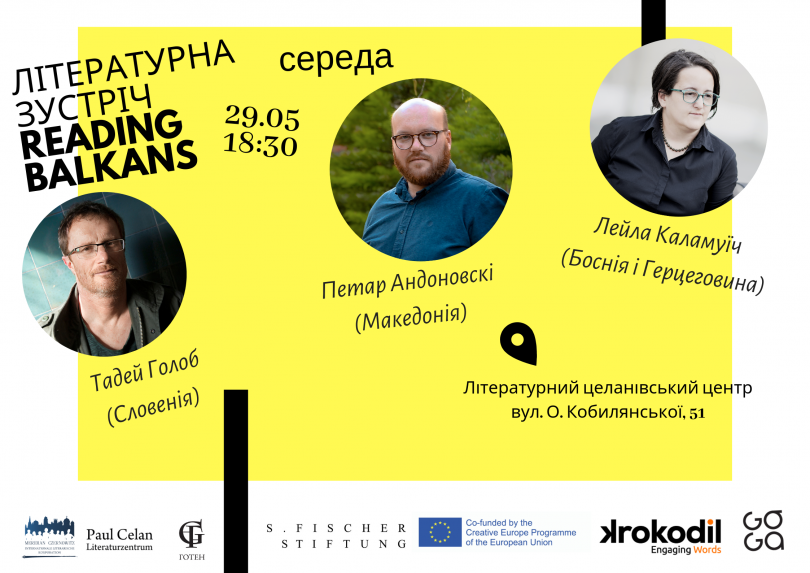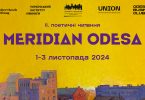An event Reading Balkans will take place on Wednesday, May 29, at 18:30 in Paul Celan Literaturzentrum.
The Reading Balkans is a cooperation project that is co-funded by the Creative Europe Programme of the European Union.
It is a cooperation project for promotion of writers in post-conflict societies and aims to link various actors active in the field of literature and promotion of literature in order to develop a joined platform which will present the region of Southeast Europe as a region of extraordinary literary creativity. The cooperation partners from Slovenia, Serbia, and Macedonia, through their many years of activities in this field and region, have established that Southeast Europe has an outstanding literary tradition; and the new generation of writers is building on that tradition, but the topics they choose are often associated with traumas of the Balkans crises of 1990s. The project is thus focused on writers who in their works warn of the perils of nationalism and intolerance and remind of their consequences. In view of the recent rise of the right-wing populism and neo-fascist movements throughout Europe, the cooperation partners believe that literary voices from Southeast Europe need to be heard on one hand in other crisis regions of Europe and on the other in major European languages such as English and German.
The aim of the project is to promote these various literary voices, who share a common background of living and working in a (post)conflict society, and to facilitate translations of their works to one of the major European languages.
Tadej Golob (born 1967) is a unique Slovene author with a thematically broad range of works. He is one of the authors of the book From Everest (Iz Everesta 2000), a mountain he has also climbed himself. He has also written biographies of sportsmen and singers and youth-fiction novels Golden Tooth (Zlati zob 2011) and Where Did Brina Disappear To? (Kam je izginila Brina? 2013) and adult fiction Pigs’ Feet (Svinjske nogice 2009) which won the 2010 Kresnik Award 2010, and Ali boma ye! (2013). The Lake is his first crime novel.
The Lake is a crime novel which has shifted the boundaries of popular fiction writing within the Slovene literary scene, managed to intrigue a wide reading audience and unify literary critics in the verdict that this is a well thought out and extremely skilfully written story. Further proof of this are the three reprints of the book within a short time after it was first published in November 2016. The novel is set in recognizable Slovenian surroundings, the tourist surroundings of Lake Bohinj and the daily routine of the capital, Ljubljana. The protagonist is a model family man and detective with quite a reputation in his field. He is also a former mountaineer, a sworn recreational sportsman who is sometimes secretive, sometime impulsive, but always thoughtful and amusing.
Lejla Kalamujić was born in Sarajevo in 1980 where she still lives. Graduated at the Department of Philosophy and Sociology. She’s the author of the two collection of stories “The Anatomy of a Smile” and “Call Me Esteban”. She is also author of contemporary socially engaged drama “Ogress, or how I killed my family”. Her second book “Call me Esteban” won “Edo Budiša Award” for best book of short stories, and was a short-listed nominee for the European Literature Prize in 2015. Besides that, Lejla won many literature awards for short stories and was awarded to various residences and fellowships. Her stories are translated into English, German, French, Macedonian, Slovenian, Polish, Romanian, Albanian and Lithuanian. Writes prose, essays and reviews in various magazines and on web portals in B&H and EX-YU countries.
In the 19 stories from this prize-winning collection (the “Edo Budiša” prize for the best short story collection written in a language which doesn’t require translation into Croatian, 2016.) we follow the protagonists emotional journey from unreliable memories of her untimely departed mother, to her childhood with an alcoholic father who is never around, to grandparents who slowly fall apart and die before her eyes, to the dissolving country in a changing world, to her discovery of her sexuality, and the anxieties of making a living. The motif of the mother seems to haunt all the stations of the journey like an omnipresent spiritus movens and it unobtrusively leads us through the protagonist’s emotional life, acquainting us with Sarajevo from before, during and after the war, the “cool crowd”, interethnic marriages, Šid as a place of exile, hospitalisation at the psychiatric ward – with Eros and Thanatos. Lejla Kalamujić’s collection is an authentic testimony of the fate of a family. The writing of this testimony is an act of courage of sorts, an act of facing up to that which is darkest and heaviest in humans.
Petar Andonovski was born in 1987, in Kumanovo, Macedonia. He studied general and comparative literature at the Faculty of Philology in Skopje. He has published the following books: Mental Space (poetry, 2008), Eyes the Color of Shoes (novel, 2013, second and third edition 2016), The Body That Has To Be Lived In (novel, 2015, second and third edition 2016). His first novel Eyes the Color of Shoes was shortlisted for the Utrinski Vesnik Novel of the Year Award in 2013. In 2016 this novel was shortlisted for the European Union Prize for Literature. The novel The Body That Has To Be Lived In won the Utrinski Vesnik Novel of the Year Award in 2015.
The Body That Has To Be Lived In follows the internal struggles of Brigitte, a sixty-year-old judge at the very end of her career who is suddenly assigned the only challenging and complex trial she has ever undertaken in her working life — a criminal case concerning the rape and murder of a young woman. Before this final case, Brigitte has only ever judged minor cases of divorce and petty theft – a kind of cheap theatre. But now she becomes abruptly aware of the marginal role she has played in the world – and of the opportunity this murder trial offers. The case opens the key for Brigitte’s path of self-realization as she finally assumes the power given to her as a judge – the power of arbitration. The novel follows Brigitte’s internal test of character in parallel with the development of the trial of the young man accused of killing his girlfriend. This internal journey is initiated by her confronting the lawbreaker — confronting the body of the accused, over which society and the law, embodied in herself, will execute its punishment.
The author of The Body That Has To Be Lived In offers us prose with subversive ideological reflection and a subtle novelistic questioning of the spirit of an epoch and a system that deeply traumatizes people. The individual trauma in the focus of his interest is not closed within itself but reflects the collective traumas caused by societal reductionism. The image of the body ‘sacrificed’ on a daily basis is the most powerful answer to the question of how to write today. Andonovski demonstrates, unlike most of the younger writers, that one must write responsibly, that one cannot escape one’s reality and that a good novel must have an attitude.











